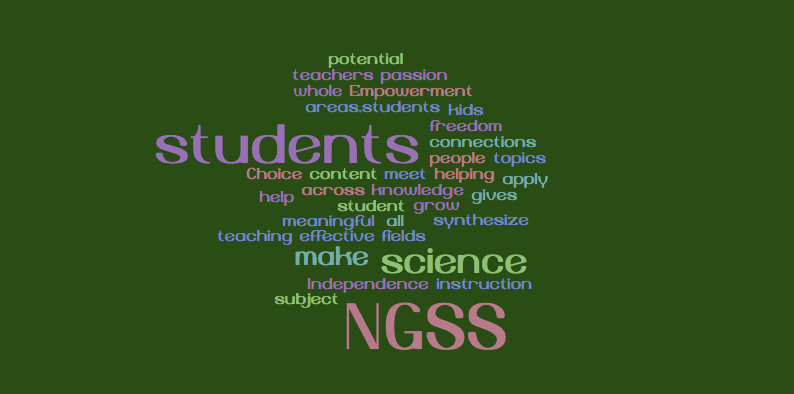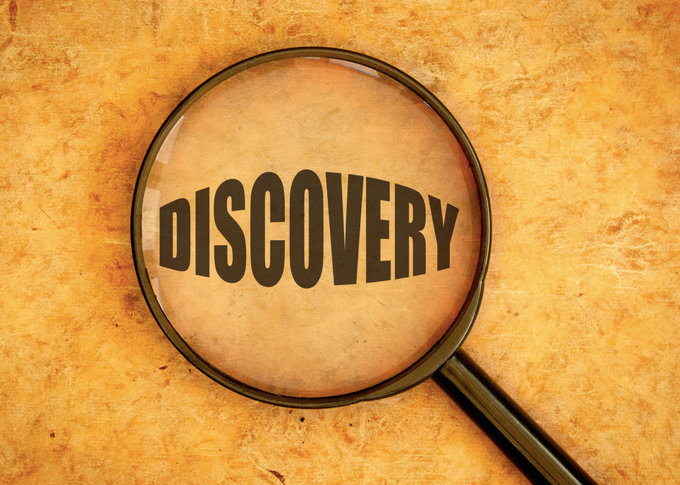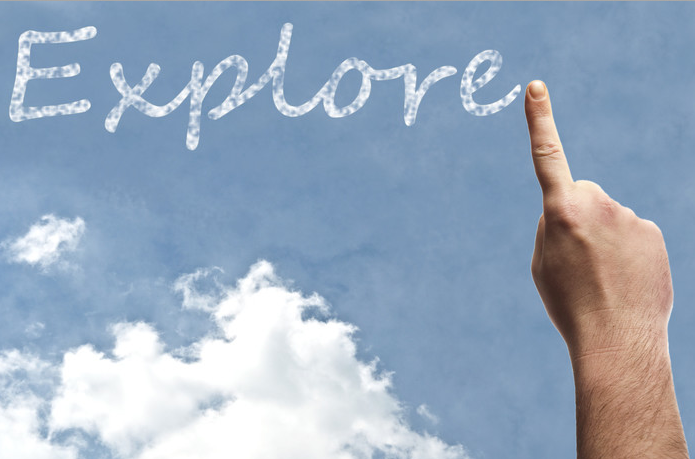What inspires you to do what you do? The NGSS MTOC (Next Generation Science Standards Multi Tools Online Community) recently reflected on our individual NGSS “whys” after viewing Simon Sinek’s Start With Why. In other words, we reflected on what inspires us to do the work that we do around NGSS. For us, transforming science education has become deeply personal which drives us to share our learning, our questions, and our journeys with others. In our community, we talk about ripples: growing your passion and inspiring others to find and amplify their own. This is a collaborative blog sharing our NGSS goals in our classrooms for the 2015-16 school year that we based on our WHY. Please read and comment to specific blog writers or to the collaborative effort as a whole.
We also encourage you to begin your own journey either by submitting a paragraph blog reflection to the question: What is your NGSS goal this year? We will add your voice to this ever-evolving blog. If so inspired, please add your voice to the conversation here_ or post a blog from your site to the hashtag #NGSSblogs.
Not ready to blog but want to join the conversation and find support? Find a goal topic that resonates with you from the headings listed below and submit the short form to be added to the list of educators with a similar focus. In this way, you can be connected with others to learn and grow together. Those on the list will receive resource updates about their focus goal. Join the list here.
We also encourage you to begin your own journey either by submitting a paragraph blog reflection to the question: What is your NGSS goal this year? We will add your voice to this ever-evolving blog. If so inspired, please add your voice to the conversation here_ or post a blog from your site to the hashtag #NGSSblogs.
Not ready to blog but want to join the conversation and find support? Find a goal topic that resonates with you from the headings listed below and submit the short form to be added to the list of educators with a similar focus. In this way, you can be connected with others to learn and grow together. Those on the list will receive resource updates about their focus goal. Join the list here.
Prompt: What is your NGSS focus for the 2015-2016 School Year?
Educator responses to the prompt shown below, divided into three categories.
PHENOMENA DRIVEN STORYLINES
photo credit: (c) tashka www.fotosearch.com
This year in my journey to implement NGSS, my focus is developing and implementing phenomenon based units and lessons. From educators in NGID, I have found a great learning community to both inspire and support me in this process. I have always used problem based activities as summative assessments, but having the phenomenon frame the entire unit or lesson gives the students more power in the learning process and gives my content a purpose. Students have consistently been more engaged in class and are taking responsibility for their learning not because they want a particular grade, but because they are interested in answering their questions about the phenomenon. I hope that my process of implementing phenomenon based instruction this school year can help other science educators see how NGSS can positively impact their own students.
Sarah
@Miss_Orear - https://keepcalmandscienceon.wordpress.com/
When anyone walks into my classroom, and asks my students what they are doing, my hope is they respond with, "I am discovering..." instead of "I am learning..." My NGSS focus for my classroom is creating storylines around the standards. I want to put the learning in the hands of my students, that they might discover the "why" around certain phenomenon. I believe that we all think in terms of narrative or story. If you ask me who I am, I eventually would describe a relationship or a story. For example I might say, “I'm Jan's daughter”. Or if I would describe myself as funny, I would tell a story that describes this fact. I think that historically science education has not used this natural way of thinking. Students have entered into science classrooms and their learning has been passive, “sit and get”. No wonder some students’ think that science is boring, or ask, “when am I going to use this in real life?” By framing my units in terms of a narrative or storyline it taps into this natural way of thinking. It encourages students to discover why, and immediately apply their scientific knowledge. People are naturally curious, wanting to know why certain phenomenon happen. I believe my students will be more successful science learners, when I move from the traditional method to students doing science and discovering the why around phenomenon. Creating a narrative that students care about is an essential piece of this puzzle. When students think this way they will become critical scientific thinkers, a skill that will last long after they graduate high school.
Carly
@gingeraffebald1
NGSS helps give guidance to teachers to better inform them in how to educate their students in the field of science. It is helping to move our thinking from memorization to application of the science through phenomena. This change is allowing students to act like practicing scientists, to ask questions, run investigations and analyze the results. We want our students to be able to take information, ask a question and have the tools to investigate it in a logical manner. NGSS helps give us a guidance to meet that goal.
I am trying to focus this year on incorporating phenomena and science experts in my classroom. By focusing on phenomena, students will see that science is not placed in silos. When investigating any phenomena, multiple branches of science will be used to ask questions and understand what is happening. Scientists do not rely on one branch of science exclusively to investigate a phenomena, they use multiple avenues and generally work in collaborative teams. It is this approach that I am trying to replicate in my classroom, albeit we are making slow progress, but we are making progress.
By bringing in experts, my students will see how the cross-cutting concepts, science and engineering practices plus disciplinary core ideas are used. Also, by talking with practicing scientists, this will allow students to see how exciting is and different avenues for possible future jobs. In talks we have conducted through this virtual approach, my students have some fantastic talks with experts a wide variety of fields and from across the globe.
Patrick
@bmsscienceteach - patrickgoff1.wordpress.com
I see the Next Generation Science Standards as pivotal to prepare students for this rapidly changing, globally interconnected world. Decision making, problem solving, collaboration, and the ability to obtain and process information are among the top 10 skills employers want (Forbes). The NGSS combines the most recent research on how students learn with the discovery and creation inherent to the field of science and engineering. The vision of the NGSS is centered on students figuring out phenomena and solutions to problems as opposed to students knowing about the world by learning discrete facts and ideas. To support my students in developing the critical thinking and inquiry-driven problem solving skills that lead to independent life-long learning and opportunity, my NGSS focus this year is to strategically and purposefully identify, select, and use phenomena to guide classroom learning. I will define phenomena as observable events or processes that are instructionally productive, attention-getting, thought-provoking and require some explanation. Unit driving anchor phenomena are both engaging to students and also complex enough to drive an entire unit of study. There are also lesson-level phenomena that fuel student sensemaking along the path to 3 dimensional learning. This focus on both types of phenomena and design through storyline drives classroom instruction and assessment and results in students empowered for the next step of their choosing; students engaged in figuring out have the capacities employers want.
Tricia
@tdishelton - https://tdishelton.wordpress.com/
Sarah
@Miss_Orear - https://keepcalmandscienceon.wordpress.com/
When anyone walks into my classroom, and asks my students what they are doing, my hope is they respond with, "I am discovering..." instead of "I am learning..." My NGSS focus for my classroom is creating storylines around the standards. I want to put the learning in the hands of my students, that they might discover the "why" around certain phenomenon. I believe that we all think in terms of narrative or story. If you ask me who I am, I eventually would describe a relationship or a story. For example I might say, “I'm Jan's daughter”. Or if I would describe myself as funny, I would tell a story that describes this fact. I think that historically science education has not used this natural way of thinking. Students have entered into science classrooms and their learning has been passive, “sit and get”. No wonder some students’ think that science is boring, or ask, “when am I going to use this in real life?” By framing my units in terms of a narrative or storyline it taps into this natural way of thinking. It encourages students to discover why, and immediately apply their scientific knowledge. People are naturally curious, wanting to know why certain phenomenon happen. I believe my students will be more successful science learners, when I move from the traditional method to students doing science and discovering the why around phenomenon. Creating a narrative that students care about is an essential piece of this puzzle. When students think this way they will become critical scientific thinkers, a skill that will last long after they graduate high school.
Carly
@gingeraffebald1
NGSS helps give guidance to teachers to better inform them in how to educate their students in the field of science. It is helping to move our thinking from memorization to application of the science through phenomena. This change is allowing students to act like practicing scientists, to ask questions, run investigations and analyze the results. We want our students to be able to take information, ask a question and have the tools to investigate it in a logical manner. NGSS helps give us a guidance to meet that goal.
I am trying to focus this year on incorporating phenomena and science experts in my classroom. By focusing on phenomena, students will see that science is not placed in silos. When investigating any phenomena, multiple branches of science will be used to ask questions and understand what is happening. Scientists do not rely on one branch of science exclusively to investigate a phenomena, they use multiple avenues and generally work in collaborative teams. It is this approach that I am trying to replicate in my classroom, albeit we are making slow progress, but we are making progress.
By bringing in experts, my students will see how the cross-cutting concepts, science and engineering practices plus disciplinary core ideas are used. Also, by talking with practicing scientists, this will allow students to see how exciting is and different avenues for possible future jobs. In talks we have conducted through this virtual approach, my students have some fantastic talks with experts a wide variety of fields and from across the globe.
Patrick
@bmsscienceteach - patrickgoff1.wordpress.com
I see the Next Generation Science Standards as pivotal to prepare students for this rapidly changing, globally interconnected world. Decision making, problem solving, collaboration, and the ability to obtain and process information are among the top 10 skills employers want (Forbes). The NGSS combines the most recent research on how students learn with the discovery and creation inherent to the field of science and engineering. The vision of the NGSS is centered on students figuring out phenomena and solutions to problems as opposed to students knowing about the world by learning discrete facts and ideas. To support my students in developing the critical thinking and inquiry-driven problem solving skills that lead to independent life-long learning and opportunity, my NGSS focus this year is to strategically and purposefully identify, select, and use phenomena to guide classroom learning. I will define phenomena as observable events or processes that are instructionally productive, attention-getting, thought-provoking and require some explanation. Unit driving anchor phenomena are both engaging to students and also complex enough to drive an entire unit of study. There are also lesson-level phenomena that fuel student sensemaking along the path to 3 dimensional learning. This focus on both types of phenomena and design through storyline drives classroom instruction and assessment and results in students empowered for the next step of their choosing; students engaged in figuring out have the capacities employers want.
Tricia
@tdishelton - https://tdishelton.wordpress.com/
STUDENT-DRIVEN INQUIRY AND EVIDENCE IN AN NGSS CLASSROOM
photo credit: www.fotosearch.com
It was not long ago that my students sat through a class and would ask, "when are we ever going to use this?" Unfortunately, in many cases, I did not have an answer. I struggled to find meaning other than because that is what the standard says and it will be on the test. With NGSS, my goal is to never hear those words again. Using things that matter to my students, like family, cancer, animals, the poor, sick children, among others, helps get them engaged and more importantly asking questions.
Many of my students have gone through school asking simple questions that are quickly answered by teachers. They have rarely had to think, find meaning, answers, or design solutions on their own. When students ask for help they have gotten answers rather than additional questions to consider. Their creativity has been suppressed and they are afraid to make mistakes. It is my goal to get my students to understand that they have the ability to make a difference in their families, school, and communities, but there is not one right way to do that.
The conversations I get to have with students is different because they are developing their own knowledge and understanding. They are coming up with the evidence to support the answers to their questions. My class is becoming student driven where it is my goal to help support their questions and guide them to the appropriate resources. I am not there yet. In fact, I am in the very beginning stages but from the conversations I've had this year with students, I am on the right track.
Nathan
@TCMSsciteach - nathanlockhart.wordpress.com
Many of my students have gone through school asking simple questions that are quickly answered by teachers. They have rarely had to think, find meaning, answers, or design solutions on their own. When students ask for help they have gotten answers rather than additional questions to consider. Their creativity has been suppressed and they are afraid to make mistakes. It is my goal to get my students to understand that they have the ability to make a difference in their families, school, and communities, but there is not one right way to do that.
The conversations I get to have with students is different because they are developing their own knowledge and understanding. They are coming up with the evidence to support the answers to their questions. My class is becoming student driven where it is my goal to help support their questions and guide them to the appropriate resources. I am not there yet. In fact, I am in the very beginning stages but from the conversations I've had this year with students, I am on the right track.
Nathan
@TCMSsciteach - nathanlockhart.wordpress.com
ACTING AND THINKING LIKE SCIENTISTS THROUGH THE SCIENCE AND ENGINEERING PRACTICES
photo credit: (c) fuzzbones www.fotosearch.com
The NGSS to me is teaching students to think and investigate like scientists. This year my focus has been on implementing the practices. I have also focused on students using claim, evidence and reasoning and communicating their evidence through writing and speaking. I think this will positively impact my students because they will be better communicators of evidence which will follow over into their everyday lives and into their futures.
Michelle
@Mschuste74
As a special education teacher I am constantly trying to learn the standards my students are being taught. This is the best way for me to understand how I can help them meet their goals of being successful in the general education classrooms. The last couple years I have been exposed to the Next Generation Science Standards and have instantly felt a passion within me to not only understand how to teach these standards but also to help my students learn the information being taught. I have learned that the standards are not just about content or mere checklist of things that students should know in order to obtain the coveted Diploma. These standards I feel are unique in the sense that the standards are personally anchored to student’s success beyond the classroom. The NGSS is about meeting a content and teaching student’s science content but as you dive deeper it is about transforming a student’s way of thinking. It is about exposing a student to experiences in which they are scientist and must think critically in order solve a problem. It is about helping students see themselves in the future as successful problem solvers no matter the career choice. Yes, the science standards were created to teach students science but they are also building the foundation one standard at a time to help each student see themselves as a successful and critical member of the class culture. Not everyone will become a scientist but everyone must think outside the box in order to address a need. Everyone will encounter a problem that may need experimentation and research in order to solve. While students walk through their science classrooms they are also being exposed to skills and are applicable in all setting.
Students with disabilities often struggle with seeing themselves becoming successful or even being a contributing member of society. Many students are so comfortable with failure that they do not take risks anymore. These students don’t see the purpose of school because school has only been a place in which their flaws are on display. The NGSS was designed to transforms our classrooms into platforms in which all students can be successful. A safe place where contribution is not shot down but rather encouraged and celebrated. So my focus for this school year is about learning more about how to integrate this into my class on daily basis. I want to learn on how to create more experiences for students to feel success while learning the content. I want to be less content driven and more about 3 Dimensional Learning. I know that there are several things about the NGSS that make me uncomfortable. Yet, this is a price I am more than willing to pay if my students can learn, meet their personal goals, and feel success and acceptance in the classroom.
Jessica
@BCHSHolman - https://atholmwithsullyscience.wordpress.com
Please join us by reflecting and sharing your thinking about the prompt: What is your NGSS focus for the 2015-16 school year? Post your blog to #NGSSblogs on Twitter or email it to .
Not ready to post your own blog, but want to join the conversation? We encourage you to begin your own journey either by submitting a paragraph blog reflection to the question: What is your NGSS goal this year? We will add your voice to this ever-evolving blog. If so inspired, please add your voice to the conversation here.
Not ready to blog but want to join the conversation and find support? Find a goal topic that resonates with you from the headings listed below and submit the short form to be added to the list of educators with a similar focus. In this way, you can be connected with others to learn and grow together. Those on the list will receive resource updates about their focus goal. Join the list here.
Michelle
@Mschuste74
As a special education teacher I am constantly trying to learn the standards my students are being taught. This is the best way for me to understand how I can help them meet their goals of being successful in the general education classrooms. The last couple years I have been exposed to the Next Generation Science Standards and have instantly felt a passion within me to not only understand how to teach these standards but also to help my students learn the information being taught. I have learned that the standards are not just about content or mere checklist of things that students should know in order to obtain the coveted Diploma. These standards I feel are unique in the sense that the standards are personally anchored to student’s success beyond the classroom. The NGSS is about meeting a content and teaching student’s science content but as you dive deeper it is about transforming a student’s way of thinking. It is about exposing a student to experiences in which they are scientist and must think critically in order solve a problem. It is about helping students see themselves in the future as successful problem solvers no matter the career choice. Yes, the science standards were created to teach students science but they are also building the foundation one standard at a time to help each student see themselves as a successful and critical member of the class culture. Not everyone will become a scientist but everyone must think outside the box in order to address a need. Everyone will encounter a problem that may need experimentation and research in order to solve. While students walk through their science classrooms they are also being exposed to skills and are applicable in all setting.
Students with disabilities often struggle with seeing themselves becoming successful or even being a contributing member of society. Many students are so comfortable with failure that they do not take risks anymore. These students don’t see the purpose of school because school has only been a place in which their flaws are on display. The NGSS was designed to transforms our classrooms into platforms in which all students can be successful. A safe place where contribution is not shot down but rather encouraged and celebrated. So my focus for this school year is about learning more about how to integrate this into my class on daily basis. I want to learn on how to create more experiences for students to feel success while learning the content. I want to be less content driven and more about 3 Dimensional Learning. I know that there are several things about the NGSS that make me uncomfortable. Yet, this is a price I am more than willing to pay if my students can learn, meet their personal goals, and feel success and acceptance in the classroom.
Jessica
@BCHSHolman - https://atholmwithsullyscience.wordpress.com
Please join us by reflecting and sharing your thinking about the prompt: What is your NGSS focus for the 2015-16 school year? Post your blog to #NGSSblogs on Twitter or email it to .
Not ready to post your own blog, but want to join the conversation? We encourage you to begin your own journey either by submitting a paragraph blog reflection to the question: What is your NGSS goal this year? We will add your voice to this ever-evolving blog. If so inspired, please add your voice to the conversation here.
Not ready to blog but want to join the conversation and find support? Find a goal topic that resonates with you from the headings listed below and submit the short form to be added to the list of educators with a similar focus. In this way, you can be connected with others to learn and grow together. Those on the list will receive resource updates about their focus goal. Join the list here.




 RSS Feed
RSS Feed
